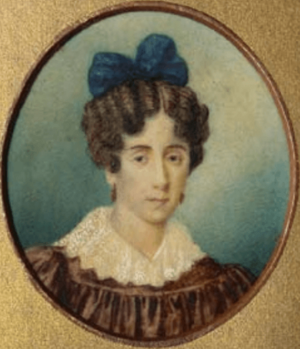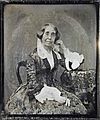Mariquita Sánchez facts for kids
Quick facts for kids
Mariquita Sánchez de Thompson
|
|
|---|---|

Jean-Philippe Goulu. María Sánchez de Velazco de Mendeville, c. 1837.
|
|
| Born |
María Josepha Petrona de Todos los Santos Sánchez de Velasco y Trillo
1 November 1786 |
| Died | 23 October 1868 (aged 81) |
| Nationality | Argentine |
| Other names | María de Todos los Santos |
| Occupation | Socialite, politician, chronicler |
| Known for | Political activism |
| Spouse(s) |
Martín Thompson
(m. 1805; died 1819)Jean Baptiste Washington de Mendeville
(m. 1820; died 1863) |
| Children | 8 |
| Signature | |
Mariquita Sánchez de Thompson y de Mendeville (born November 1, 1786 – died October 23, 1868) was an important Argentine woman. She was known for hosting famous social gatherings called tertulias in Buenos Aires. Many important people of her time attended these events. She is especially remembered because the Argentine National Anthem was sung for the very first time at her home on May 14, 1813.
Mariquita was one of the first Argentine women to speak out about politics. She is seen as a very active female figure during the time of the Argentine Revolution.
She married her cousin, Martín Jacobo Thompson, in 1805. She also wrote about the failed British invasions of Buenos Aires. This showed how locals felt about these invasions.
After her first husband died in 1819, she married Jean Baptiste Washington de Mendeville, a Frenchman, around 1819 or 1820. During the rule of Juan Manuel de Rosas, she lived away from home in Montevideo. She also visited Rio de Janeiro before finally returning to Buenos Aires after the Battle of Caseros.
Contents
Life
Growing Up and First Marriage
Mariquita Sánchez de Thompson was born on November 1, 1786, in Buenos Aires. Her parents were Cecilio Sánchez de Velasco and Magdalena Trillo. Her family was part of the wealthy Spanish group in Buenos Aires. They had strong political connections, which meant Mariquita had a special childhood.
When Mariquita was 14, she wanted to marry Martín Jacobo de Thompson. He was 23 and her second cousin. Martín was a sailor and an officer in the Spanish Royal Navy. He had studied in Europe and believed in Argentina becoming independent.
Mariquita's parents did not approve of this marriage. They wanted her to marry an older man from Spain. Her father even used his connections to send Martín to Spain. Mariquita was sent to a special house often used to make disobedient daughters change their minds.
After her father died in 1802, her mother still did not want her to marry Martín. But when Martín came back from Spain, Mariquita and Martín took her mother to court in 1804. Mariquita wrote a letter to Viceroy Sobremonte. She argued against the old custom where families arranged marriages without asking the women. She won her case, and she was allowed to marry Martín Thompson on July 20, 1804. They got married in 1805.
A Leader in Society
During her marriage to Martín Thompson, Mariquita had five children. She also became well-known in society and as a writer. She supported the Argentine independence movement. In 1810, she donated gold to the cause. In 1812, she sewed uniforms for the "patriot army."
Mariquita started a famous salon in Buenos Aires. A salon was a place where important people met and talked. She hosted tertulias, which were social gatherings like parties. These were some of the most famous in the entire Viceroyalty. Many important people and officials came to her house.
After the revolution, Mariquita and Martín's home became a place for artists to meet. At her tertulias, guests danced, played cards, listened to music, and talked about business, books, religion, and politics. Martín Thompson was also a political official. He traveled to the United States in 1817 to discuss independence. Sadly, he died on his way back in 1819. After his death, Mariquita was a widow with five children.
Later Life and Exile
In 1819 or 1820, Mariquita married Jean-Baptiste Washington de Mendeville. He was a French nobleman and worked for the French government in Buenos Aires. Some people say their marriage was not a happy one. Mariquita even started to support the idea of divorce in the 1830s. Their marriage continued until Mendeville was sent back to France in 1835.
After marrying Mendeville, Mariquita kept hosting her tertulias. Her home remained a center for music, art, and charity work, as well as politics. In 1823, she worked with President Bernardino Rivadavia. Together, they founded the Sociedad de Beneficencia. This was the first charity group run by women in Buenos Aires. It aimed to protect and educate women. This allowed women to take part in public life.
During the time when Juan Manuel de Rosas was a dictator, the Sociedad de Beneficencia was closed down. Mariquita went to live in Montevideo, Uruguay, away from her home. During this time, she wrote many of her famous letters and other works. In 1846, Mariquita went to Rio de Janeiro. When she returned to Montevideo, she thought about going to Europe. But she decided to stay in Montevideo. She died in Buenos Aires on October 23, 1868.
Her Writings
Mariquita Sánchez is best known for the many letters she wrote to her family while she was away from home. People described her as someone who wrote a lot and with great feeling. Her writing was seen as very skilled because she had a good education. Her works were known for being "civilized and enlightened."
Her writings included personal letters, poems, notes, a diary, and a description of life in Buenos Aires when it was a colony. Her writings also explored ideas about being a citizen and having a nationality. This was because her husbands were from European countries, and she lived in a colonial nation. Her Diary from Montevideo was written in 1839–1840. In it, she shared and thought about political information. Mariquita Sánchez's letters from 1804 to 1868 and her Diary from Montevideo were finally published in 1952.
Why She's Remembered
Mariquita Sánchez is mostly remembered for her political work and for supporting women. This includes her work with the Sociedad de Beneficencia. Some historians have called her "the most important female figure of Argentinean early republican life." This is not only because of her political work but also because she knew so many important people.
Mariquita Sánchez is also believed to be the first person to sing the Argentine National Anthem. It is said that the anthem was sung for the first time at her house on May 14, 1813. This story even appears in elementary school textbooks. She is also remembered for her writings and her famous tertulias. Mariquita Sánchez has even been called a "symbol of the nation" in many ways.
Different Views of Her Life
Some parts of Mariquita Sánchez's life have been questioned by historians. For example, some accounts say she was married and pregnant with Mendeville's child in 1819. This was the same year her first husband, Thompson, died. Also, she received a lot of money after Thompson's death. This has led some to suggest that Mendeville might have married her for her money.
Even though Sánchez lived away from home in Montevideo, there is proof that she returned to Buenos Aires many times. There are also records that she lived in Buenos Aires from 1847 to 1851. This makes some wonder about how strict her exile really was. As a dictator, Rosas placed many limits on his political opponents' travel. But there are no records of these limits being placed on Sánchez. This might mean that her political role at that time was not as big as some believe.
Gallery
-
María Sánchez de Mendeville (1845), a portrait by Johann Moritz Rugendas, found at the National Historical Museum
-
The Argentine National Anthem being played for the first time at Sánchez de Thompson's house. This painting is by Pedro Subercaseaux
-
This is the only known photograph of Sánchez de Thompson, a daguerreotype from 1854
-
Sánchez de Thompson's resting place at La Recoleta Cemetery
Tribute
On November 1, 2014, Google celebrated her 228th birthday with a special Google Doodle.
See also
 In Spanish: María Sánchez de Thompson para niños
In Spanish: María Sánchez de Thompson para niños
 | May Edward Chinn |
 | Rebecca Cole |
 | Alexa Canady |
 | Dorothy Lavinia Brown |






